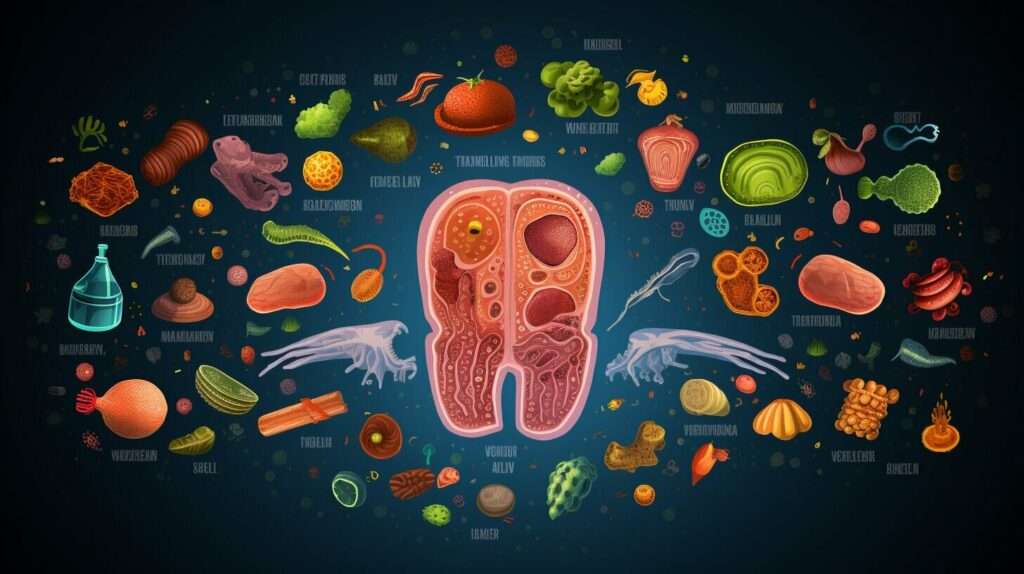When it comes to your overall health, gut health plays a crucial role. Your gut is home to trillions of microorganisms, collectively known as the gut microbiome, which help digest food, produce essential nutrients, and regulate the immune system. Therefore, maintaining a healthy gut is essential for optimal well-being. In this section, we will discuss the importance of gut health and provide an overview of how to improve it.
Key Takeaways:
- Your gut health is essential for overall well-being
- The gut microbiome plays a crucial role in digestion and immune regulation
- A healthy gut can be achieved through proper diet, lifestyle changes, and supplements
The Benefits of a Healthy Gut
Having a healthy gut is crucial for your overall well-being. Your gut plays a vital role in digestion, nutrient absorption, and even the strength of your immune system. When your gut is healthy, you are more likely to feel energetic, have a better mood, and enjoy better sleep.
The following are some of the benefits that come with maintaining a healthy gut:
| Benefit | Description |
|---|---|
| Improved Digestion | When your gut is healthy, you are less likely to experience constipation, bloating, or diarrhea. Your body can break down food and absorb nutrients efficiently, preventing digestive discomfort. |
| Enhanced Nutrient Absorption | A healthy gut allows your body to absorb essential nutrients, such as vitamins and minerals, more effectively, ensuring you receive the nutrients you need to stay healthy. |
| Stronger Immune System | 70% of your immune system is located in your gut. A healthy gut means a strong immune response, which reduces the risk of getting sick and improves the body’s ability to fight illnesses. |
| Better Mood | There is a strong connection between the gut and the brain, known as the gut-brain axis. A healthy gut contributes to a better mood and can reduce anxiety and depression. |
| Better Sleep | The gut produces and regulates many hormones, including those responsible for sleep regulation. A healthy gut can help you fall asleep faster and achieve a more restful sleep. |
By prioritizing your gut health, you can reap all of these benefits and enjoy a higher quality of life.

Understanding the Importance and how to Improve Gut Health and Digestion
When it comes to overall well-being, gut health plays a crucial role in the digestive process. The gut microbiome, which consists of trillions of microorganisms, helps break down food and absorb nutrients, as well as support the immune system.
However, an imbalance in the gut microbiome, often caused by poor dietary choices, stress, and other lifestyle factors, can lead to digestive issues, such as bloating, constipation, and inflammation.
Proper digestion is also essential for gut health. When food is not properly broken down, it can cause discomfort and contribute to nutrient deficiencies over time. This is why it’s important to prioritize gut health to maintain overall well-being.

“Your gut is the cornerstone of your body’s overall health and well-being.” – Dr. Amy Myers
Tips for Promoting Gut Health
If you’re looking to improve your gut health, there are several simple steps you can take:
- Eat a diverse range of fiber-rich foods: This includes fruits, vegetables, whole grains, nuts, and seeds. These foods are rich in prebiotics, which feed the beneficial bacteria in your gut and help maintain a healthy balance of gut flora.
- Stay hydrated: Drinking plenty of water helps keep your digestive system functioning properly and flushes toxins from your body.
- Manage stress levels: Chronic stress can negatively affect gut health, so finding ways to manage stress, such as through meditation or yoga, can be beneficial.
- Get regular physical activity: Exercise can promote healthy digestion and help reduce inflammation in the gut.
It’s also important to avoid or limit certain foods and behaviors that can negatively impact gut health:
- Processed and sugary foods: These foods can disrupt the balance of gut bacteria and lead to inflammation.
- Excessive alcohol consumption: Alcohol can irritate the gut lining and disrupt the balance of gut bacteria.
- Smoking: Smoking has been linked to several digestive disorders and can contribute to an imbalance of gut bacteria.
Making these changes to your diet and lifestyle can help promote a healthy gut and improve your overall well-being.

Gut-Healthy Foods
Consuming foods that promote gut health is an essential part of maintaining a healthy microbiome. Here are some recommended foods:
- Fermented foods: These are rich in probiotics which promote a healthy gut flora. Examples include kimchi, kefir, sauerkraut, and yogurt.
- Prebiotic foods: These foods are rich in fibers that promote the growth of healthy bacteria in the gut. Examples include onions, garlic, bananas, and oats.
- Probiotic supplements: These are a convenient way to ensure regular consumption of beneficial probiotics. Look for supplements that contain multiple strains of bacteria.
Adding these gut-healthy foods to your diet can provide numerous benefits and help to improve your overall well-being.

The Role of Supplements in Gut Health
If you’re looking to improve your gut health, supplements may be a helpful addition to your regimen. Supplements can provide your body with the necessary nutrients to support a healthy gut microbiome and improve digestion. However, it’s important to choose the right supplements for your individual needs, as not all supplements are created equal.
Probiotics: Probiotics are beneficial bacteria that can help balance the gut microbiome and may improve digestive issues such as bloating, gas, and diarrhea. Look for high-quality probiotic supplements that contain a variety of strains and have at least 10 billion CFU (colony-forming units) per serving.
Prebiotics: Prebiotics are types of dietary fiber that feed the beneficial bacteria in the gut. They can help increase the growth of these bacteria and improve overall gut health. Prebiotic supplements are available in powder form and can be added to smoothies or other foods.
Digestive enzymes: Digestive enzymes can help break down food and improve digestion. They may be especially helpful if you have issues with digesting certain foods, such as lactose or gluten. Look for broad-spectrum digestive enzyme supplements that contain a variety of enzymes to help break down different types of nutrients.
Other supplements: Other supplements that may support gut health include glutamine, collagen, and zinc. Glutamine is an amino acid that can help promote gut healing, while collagen may help strengthen the intestinal lining. Zinc is a mineral that is important for overall immune function and may also support gut health.
While supplements can be helpful for improving gut health, it’s important to remember that they should not be relied on as a replacement for a healthy diet and lifestyle. Be sure to talk to your healthcare provider before adding any new supplement to your routine.
| Supplement | Benefits |
|---|---|
| Probiotics | Balance gut microbiome, improve digestion |
| Prebiotics | Feed beneficial gut bacteria, improve gut health |
| Digestive enzymes | Break down food, improve digestion |
| Glutamine | Promote gut healing |
| Collagen | Strengthen intestinal lining |
| Zinc | Support immune function, improve gut health |

Gut Health and Immunity
Did you know that your gut health plays a significant role in your immune system? A healthy gut microbiome can help strengthen your immune response and protect against certain illnesses.
Studies have shown that a diverse microbiome, with a balance of good bacteria, can boost the production of antibodies and immune cells, helping to fight off infections and diseases. On the other hand, an imbalanced gut microbiome can lead to inflammation and a weakened immune system, increasing the risk of illness.
So, how can you promote gut health to support your immune system? One key way is through diet. Consuming a variety of gut-healthy foods such as fermented foods, prebiotic-rich foods, and probiotics can help nourish the good bacteria in your gut.

Another important factor is lifestyle. Reducing stress levels, getting enough sleep, and exercising regularly can all help promote a healthy gut microbiome and, in turn, support a strong immune response.
If you are looking for additional support, gut health supplements such as probiotics and digestive enzymes may also be beneficial. Consult with your healthcare provider to determine the right supplement regimen for your individual needs.
Lifestyle Factors Affecting Gut Health
Your gut health is influenced by various lifestyle factors that can either support or hinder its proper functioning. Making positive changes to your lifestyle can go a long way in improving your gut health and overall well-being.
Poor Dietary Choices
Your diet has a significant impact on your gut health. Consuming a diet high in processed foods, sugar, and unhealthy fats can disrupt the balance of beneficial bacteria in your gut. This can lead to inflammation, digestive problems, and a weakened immune system.
To promote gut health, aim to eat a diet that is rich in whole, nutrient-dense foods. Include plenty of fruits and vegetables, whole grains, lean protein sources, and healthy fats in your daily diet. Avoid processed foods, sugary snacks, and excess alcohol consumption as much as possible.
Lack of Sleep
Quality sleep is essential for your overall health and well-being, including your gut health. Lack of sleep can disrupt the delicate balance of your gut microbiome, leading to inflammation and digestive problems.
To promote gut health, prioritize quality sleep by establishing a consistent sleep schedule, creating a relaxing bedtime routine, and avoiding stimulating activities before bedtime. Aim for at least 7-8 hours of sleep per night.
Excessive Alcohol Consumption
Excessive alcohol consumption can wreak havoc on your gut health. It can disrupt the balance of beneficial bacteria in your gut, leading to digestive problems, inflammation, and a weakened immune system.
To promote gut health, limit your alcohol consumption and choose healthier alternatives such as water, herbal tea, or kombucha. If you do drink alcohol, aim to do so in moderation and avoid binge drinking.
Smoking
Smoking can have a detrimental effect on your gut health. It can disrupt the balance of beneficial bacteria in your gut, leading to digestive problems, inflammation, and a weakened immune system.
To promote gut health, quit smoking or avoid exposure to secondhand smoke as much as possible.

By making positive lifestyle changes, you can improve your gut health and support overall wellness. Remember to prioritize a healthy diet, quality sleep, limited alcohol consumption, and avoiding smoking. Taking care of your gut is one of the best things you can do for your health.
Conclusion
Improving your gut health is crucial for your overall well-being. By prioritizing your gut health, you can experience various benefits such as improved digestion, enhanced nutrient absorption, stronger immune system, and better mental health.
It is important to understand the role of gut health in your digestive process, emphasizing the impact of a balanced gut microbiome and proper digestion. There are various ways to promote gut health such as eating a diverse range of fiber-rich foods, staying hydrated, managing stress levels, and getting regular physical activity.
Additionally, incorporating gut-healthy foods such as fermented foods, prebiotics, and probiotics can also benefit your gut health. Supplements like probiotics and digestive enzymes can also be considered as an alternate option to support gut health.
It is important to remember that lifestyle factors such as poor dietary choices, lack of sleep, excessive alcohol consumption, and smoking can negatively impact your gut health. Therefore, making positive lifestyle changes can help maintain a healthy gut microbiome.
Take charge of your gut health and make the necessary changes to improve your overall well-being.
FAQ
Q: Why is gut health important?
A: Gut health is important because it plays a crucial role in overall well-being. A healthy gut is responsible for proper digestion, nutrient absorption, and maintaining a strong immune system.
Q: How can I improve my gut health?
A: There are several ways to improve gut health. Some tips include eating a diverse range of fiber-rich foods, staying hydrated, managing stress levels, getting regular physical activity, and incorporating gut-healthy foods and supplements into your diet.
Q: What are the benefits of a healthy gut?
A: Maintaining a healthy gut has numerous benefits, including improved digestion, enhanced nutrient absorption, a stronger immune system, and better overall well-being.
Q: What role does gut health play in digestion?
A: Gut health is crucial for proper digestion. A balanced gut microbiome and efficient digestion ensure that nutrients are properly broken down and absorbed, promoting optimal digestive health.
Q: What are some gut-healthy foods?
A: Some gut-healthy foods include fermented foods (such as yogurt and sauerkraut), prebiotics (such as garlic and onions), and probiotics (found in certain supplements or yogurt).
Q: Do gut health supplements help?
A: Gut health supplements, like probiotics and digestive enzymes, can provide benefits for some individuals. It is important to choose supplements that align with your specific needs and consult with a healthcare professional.
Q: How does gut health affect immunity?
A: Gut health and immunity are closely connected. A healthy gut supports a strong immune response, helping to reduce the risk of certain illnesses and infections.
Q: What lifestyle factors can affect gut health?
A: Several lifestyle factors can impact gut health, including poor dietary choices, lack of sleep, excessive alcohol consumption, and smoking. Making positive lifestyle changes can greatly improve gut health.






